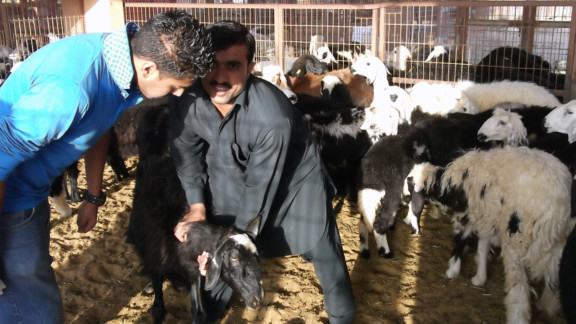
Al Ain: A nationwide hunt has begun to buy an affordable and, most importantly, defect free animal for the festival of sacrifice, Eid Al Adha, falling on October 26 this year.
Sensing the Eid just around the corner, live stock markets have been getting additional stocks of goats, sheep, cattle, and camels to deal with the expected high demand across the country.
The markets in Al Ain, Abu Dhabi, Dubai, Sharjah, Ras Al Khaimah, and other UAE cities are though passing through a lull, but traders expect customers’ influx a few days later. “The actual rush will be on a day before or on the Eid day,” said Ali Khan, a goat seller at the Central Livestock Market in Al Ain.
Municipalities across the country have also been making special arranges for animal display, price control mechanisms, and setting up rules for slaughtering and environment protection guidelines. A ban has already been imposed on animal slaughtering at public places in Abu Dhabi Emirates where people have been asked to go to municipalities’ abattoirs.
Most Muslims scarify animals on Eid Al Adha, which means festival of sacrifice, as a religious practice to show their obedience to God. The festival also observed to remember of the willingness of Prophet Ebrahim who tried to sacrifice his only son Ismael, also a prophet, to demonstrate his obedience to God. The prophet sacrifice was later replaced with a sheep.
Eid Al Adha is celebrated on the 10th day of the last Islamic month of Dhual Haj every year. The sacrificial animal meat is traditionally given to the poor, friends and neighbours. Portions are also cooked for the family offering the sacrifice.
People have feared a usual price hike in the wake of rising inflation, high demand, and profiteering inclinations of traders. Dubai has given some confidence to the buyers on Monday by saying cattle prices will not be allowed to rocket.
Dr Hashim Al Nuaimi, director of the Consumer Protection Department, warned traders will be fined heavily — between Dh5,000 and Dh100,000 — if they increase cattle prices this festive season. In an inspection tour to the livestock market, he asked traders to slash prices by about 20 per cent.
Many customers at the Central Livestock Market in Al Ain described the prices as high, saying authorities must intervene to normalise the livestock market. “I believe traders have been taking undue advantage of the Eid by selling sheep, goats, and cows at higher prices,” said Ahmad Kareem, an expatriate customer.
The most attractive animals are the sheep and goats that are imported from Saudi Arabia. “We call them Najadis, and they are beautiful in looks and have bulky weights,” said Ali Khan, a trader. The mutton of these sheep is also much better than the sheep coming from India, Pakistan, Somalia, and other countries. “Najadis are a hot cake in the market, Khan said, adding that locally bred sheep and goats are also available in the market.
Imran Hussain, a customer, said people must pay special attention to animals’ condition before buying them as sacrificial animals must be free of all defects. “Their horns and teeth must not be broken,” he said, adding that such animals are a gift to Allah therefor must be in good condition.
Some traders, said Hussain, have been selling animals with tags pierced through sheep and goats’ ears. In Hussain’s view, such animals are unfit for sacrifice. Similarly, the breeders also crush the gonad or male organs of sheep. The technique let the sheep gain more weight and fetch more prices in the market. Such sheep are also unfit for the sacrifice, he added.
Mushtaq Raheem, another trader the market, said almost all the animals in the market are carrying tags since UAE authorities install them after a careful inspection. The tag is a sign showing the animal is healthy and fit for sale in the market. “I am personally not aware of such conditions for sacrificial animals,” he added.
Talking about the prices, Raheem said market has been picking up and the real shopping would start a few days later as it is difficult to keep animals at homes for most of the people. He said many reasons affect the prices such as high inflation, increase in transportation charges, government fees, and increase in rents and fodder prices. “We have a low profit margin but have to cover the overheads also,” he said, while refuting the charges of profiteering.












